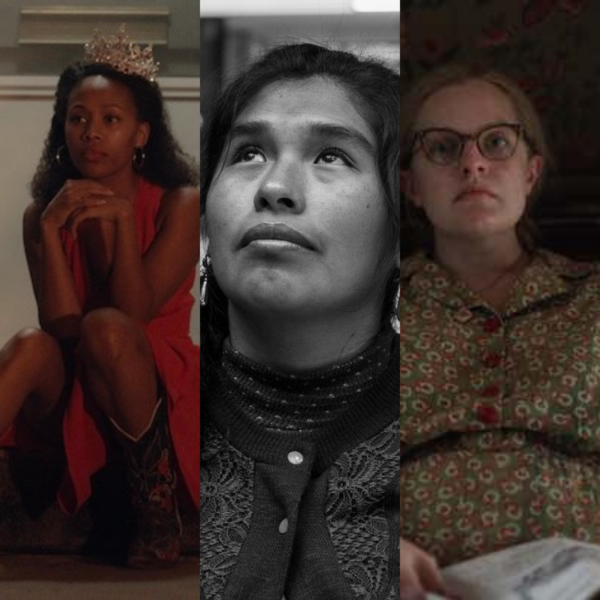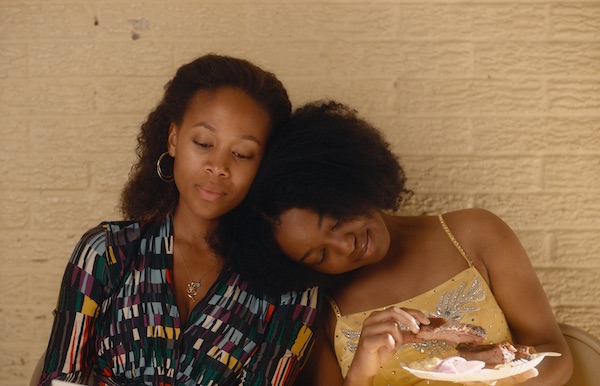
“I’m a workaholic,” admits Caryn Coleman. The director of programming/special projects at Brooklyn’s Nitehawk Cinema, she responded to the cataclysmic changes brought upon the world in 2020 by switching gears and focusing on her passion project: The Future of Film is Female. Begun in 2018 by Coleman, its founder and director, Future of Film is an initiative designed to boost the work of female filmmakers through the funding, exhibition, and promotion phases. In 2020, it hosted online talks and virtual screenings, while behind the scenes Coleman threw herself into the administrative side of things, working to form a board and file for non-profit status. Now, in 2021, Future of Film joins forces with New York City’s Museum of Modern Art for the third time. Their series, “The Future of Film is Female, Part 3,” runs from February 11-23.
The screening series launches in the midst of an award season that’s seeing female directors—like Nomadland‘s Chloé Zhao, Promising Young Woman‘s Emerald Fennell, and One Night in Miami‘s Regina King—gain an unprecedented amount of traction. “We were poised for a fabulous year of great films directed by women,” Coleman says. (Early in 2020, Future of Film hosted a series called “Congratulations to Those Men,” a reference to Issa Rae’s pointed barb upon announcing the all-male Best Director nominations for that year’s Oscars.) At the same time, “I just can’t help but think of the other ones,” she says—independent films by female directors that have gotten lost in the shuffle over the past year-and-a-half. Drawing attention to those films is the purpose of Future of Film and MOMA’s screening series, which this year pairs ten features with ten short films.

Opening the series is Miss Juneteenth, from writer/director Channing Godfrey People, about a former beauty queen (Nicole Beharie) working with her daughter to prepare for the “Miss Juneteenth” pageant. The film premiered at last year’s Sundance and went on to gain critical accolades across the festival circuit; however, as is the case with most of its indie compatriots that had the back luck to come out in 2020, it never had a theatrical release. Instead, it went to PVOD on (appropriately) June 19th and screened on BET on Thanksgiving. Another film that’s part of this year’s Future of Film lineup, Alice Wu’s The Half of It, “was always going to be on Netflix,” Coleman says. “And they were actually working on a theatrical run for her, and then all that stuff happened. It was just horrible.”

The need to highlight films that may have gotten lost in the streaming shuffle is even more important for this edition of Future of Film, whose selections come from a year where theatrical release was all but non-existent. “Basically all of the [features we’ve programmed], except for [Elizabeth Lo’s documentary Stray], have already had a life online. Normally, even if a film has had a theatrical run, or it’s streaming on Amazon Prime or Netflix, a lot of people have not seen the film. You really are introducing the film—in person—to a lot of people.” Coleman is counting on the fact that, even with this year’s films largely available through other streaming platforms, that same tradition will hold true, with MOMA members being introduced to films that would not have otherwise been on their radar.
MOMA members, for this and other virtual series that have taken place at (or “at”) the museum since the pandemic, are the only ones who can watch films in this series, whereas in previous years non-members could buy tickets to individual films. If access is more limited in the series’ virtual incarnation, Coleman is encouraged by the how the transition to digital has allowed to her vastly expand the filmmaker Q&As. “It’s unfettered,” she says. “It’s not like, ‘OK, we have 12 minutes before the next film has to load in. You made the film? Great. Fun? Awesome. OK, let’s go.” Instead, the standard post-screening Q&As are replaced by 30-40 minute conversations. These are mostly between Coleman and the filmmakers, though programmer Opal H. Bennett interviewed Elizabeth Lo (Stray), and Amy Seimetz (She Dies Tomorrow) and Josephine Decker (Shirley) had a filmmaker conversation together.

In addition to the aforementioned films, Coleman highlights Song without a Name (Canción sin nombre), from first-time feature director Melina León. “I honestly feel it’s on par with Roma,” says Coleman. “It’s about a indigenous woman in Peru who gives birth in a clinic in Lima, and they steal her baby. She teams up with a reporter to investigate these crimes…. It’s stunningly visual. The acting is incredible. The story is heart wrenching. And the resilience of this woman is insane.” Also on Coleman’s not-to-miss list is another feature debut, the “super original” The Planters, by Alexandra Kotcheff and Hannah Leder. “It is exactly what a micro budget indie film should be,” says Coleman. “They wrote it. They directed it. They starred in it. They edited it. They did all of the sound recording. They were their own crew.” On the shorts side, Coleman points out the The Planter‘s companion documentary Still Processing, in which director Sophy Romvari goes grieves the loss of her two brothers. “If you don’t cry,” jokes Coleman, “you’re dead inside.”

“For something like this, the whole idea is to have it be contagious,” says Coleman—giving not just films but filmmakers who have been overlooked a new audience. “Male directors, they make a great first film. Then they make a second film, and it’s kind of ehhh. But they’re still allowed to make their third, their fourth, their fifth, their sixth. They get their Marvel movie. And there are so many great women directors who don’t have that chance. This is designed to be one of those bump-ups.” Coleman points to Nia DaCosta’s Little Woods, which screened in “The Future of Film Is Female, Part 2” in 2019. Her next film is Universal’s Jordan Peele-produced Candyman remake.
The goal of The Future of Film is Female—both the MOMA screening series and the organization in general—is to not have “another Barbara Loden on our hands”—referencing the actress-turned-director who directed one film, 1970’s Wanda, that’s now considered an independent classic. “I don’t want, 20, 30 years from now, there to be another film programmer who’s like: ‘Hey, that Channing Godfrey—she was amazing!’ I want to support people now.”
Visit The Future of Film is Female, Part 3 for this year’s lineup.


Share this post